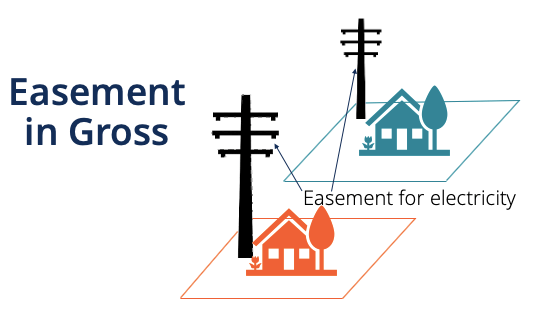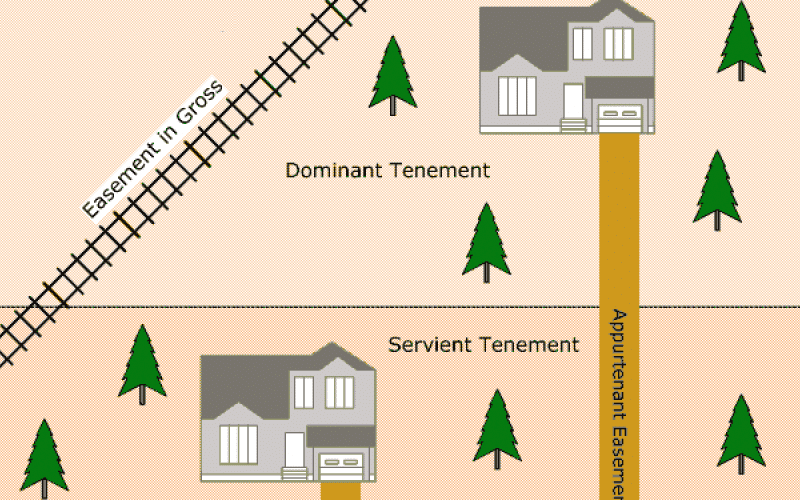You’ve just got a land, and you realize it full of fossil fuel pipeline or with power lines running underneath your property. what do you do with them? Absolutely nothing because you do not own them but you can allow others to make use of the property as per their wish. The Petroleum and the utility companies have an easement in gross to lay and maintain the pipes and lines. This text deals with easements in gross, its definition, termination, a sample including practical examples.
What is Easement in Gross?
This is the right a person has to exercise limited ownership or possession over another person’s property. it is a nonpossessory property interest held by another party in another person’s land.
From the above, definition, an easement in gross creates contentious issues between neighboring land owners but it is also essential for their benefits. For instance, Mr. A uses conservation easements to ensure that his land is safe. similarly, Mr.B uses foster cooperation to ease accessibility ensuring the parcel of land is utilized accordingly.
Specifically, another example occurs when a landowner grants another person the right to come upon his land to plant or fish.
However, once the owner of this easement passes away or sells the property to another owner. Therefore, the other party has no right to use the land for these activities again.
In simple words, An easy definition of easement in gross is a legal right allowing an individual or entity to use someone’s land/property. An easement in gross agreement benefits the property owner as an individual, not the property. Therefore, an easement holder is not entitle to transfer the benefits to another party.
Easement in Gross Example
Easement in gross is mainly for utility companies. They are created by implication, meaning that an easement is required for the use of the property. Thus, here are few examples of easements in gross below
#1. Pipeline easements
They are the most common easements in gross that permit pipeline companies to access buried sewer or water pipes, or service and renovate pipes.
#2. Utility company easements
These types of easements in gross makes it possible for a utility company to service part of a property or maintain equipment needed to supply utility services.
#3. Land conservation easement.
This type of easement prevents an owner from taking actions that would affect the conservation of the land. This include extracting minerals or cutting down of useful trees.
#4. Easements by Necessity
A legal easement only exists if it’s absolutely necessary to cross someone’s land for a legitimate purpose. The law grants people the right access to their homes. This means that if the only access to Mr. A piece of land is by crossing through Mr. B’s property, the law recognizes an easement allowing access over that land. This is because Mr. A has the legal right through easement and Mr. B may not interfere with such right. However, this easement in gross example seems best.
How does it Works?
An easement in gross affects both the owner of the property and the beneficiary. like a regular easement, that directly affects the property. Indeed, the agreement becomes invalid If the property is inherited by another person. However, the new owner will need a new contract if there is a need for a transfer of ownership.
Note: that the beneficiary cannot transfer the related rights to any other party. Therefore, the property owner has control with regard to the restrictions outlined in the easement agreement template. In some cases, the property owners might be unable to construct some permanent structures.
Rights Associated with Easement in Gross
#1. The holder of the contract is free to do whatever necessary to enjoy the benefits granted by the agreement as long as it does not cause trouble for the property owner.
#2. owever, the land/property owner can use the property/land but not to interfere with the holder’s right.
#3. If the holder has burdened the property by the unacceptable extent of use of the easement in gross, and the court establishes it, the property owner can resort to legal solutions.
#4. In cases where the holder damages the property, the court can limit the access of property to the holder or terminate the agreement.

Easement in Gross Termination
An easement might be permanent meaning it will never expire. The owner of the easement may terminate the easement in different ways. Futhermore, Here are some examples on how easements may expire:Easement in gross termination is also applicable when the dominant owner dies.
#1. If there is an easement in gross agreement specifying a purpose for the easement, the termination appears when that purpose can no longer be useful, even if the easement agreement doesn’t specify it.
#2. An easement in gross termination comes in when the building or structure is destroyed.
#3. An easement that benefits or burdens less than a fee simple estate ends when the relevant estate ends.
#4. If the property owner interferes with the rights of the easement holders, then he is trespassing. However, the courts will order the elimination of the obstacle in the easement in gross. The courts may also likely provide compensation to the easement holder for injuries.
#5. When there no more interest in the use of the property, the dominant property owner can execute a release agreement with a signature to the subordinate property owner.
Easement in Gross Sample
Below are samples of easement in gross agreement forms. Thus, we advise that you contact an attorney for legal advise. The easement in gross sample below is just a guide.


Related Articles:
Buy and Sell Agreement: How It Works, Key Elements, and Importance
Property Management Business: All You Need to Start From Scratch (+ a Workable Model)
THE MIND OF A SUCCEEDING ENTREPRENEUR(Opens in a new browser tab)
Financial Performance: A Comprehensive Guide For Any Business(+ quick tools)
Real Estate Business: A Definitive Guide for Beginners (+ How to start tips)
Conclusion
In summary, an easement in gross is a right that allows an individual or an entity to use someone else’s land/property. Although, it becomes invalid when the property is transferred, sold, or inherited by another person. It beneficial to the property owner and the holder cannot transfer the benefits to another person(Third Party).






